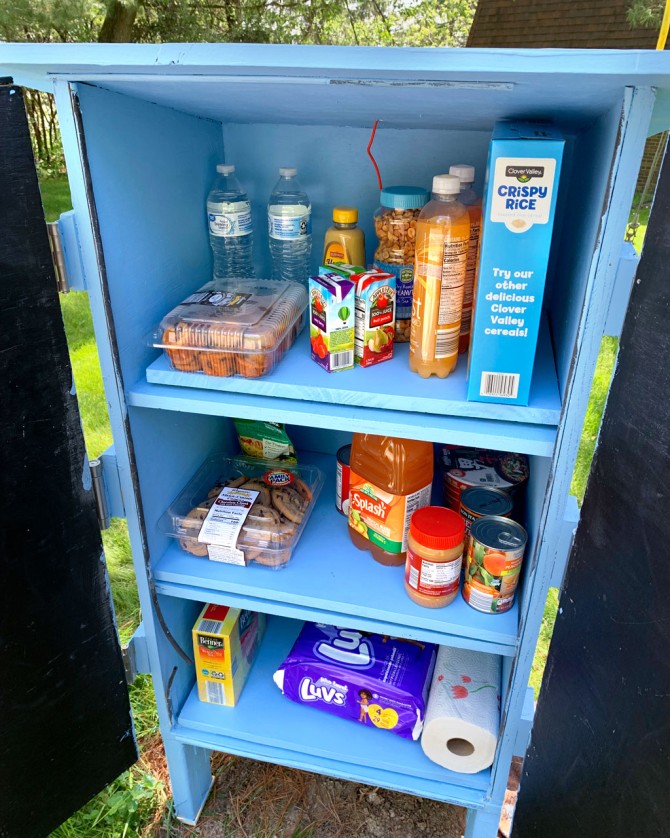Curbing hunger: Students build inventive outdoor food pantry
By Blaine Friedlander, Cornell Chronicle
Social justice and engineering blend beautifully.
In a spring semester class, seven Cornell engineering undergraduates planned and built an outdoor food-sharing pantry cabinet for Mutual Aid Tompkins, hoping to take an edge off chronic hunger among Tompkins County residents.
The blue wooden cabinet in Lansing, New York, sports technology that other communities may someday want: It can alert Mutual Aid Tompkins volunteers to the need for more food when the shelves become bare, so they don’t have to manually check this pantry or the nearly 60 food cabinets the organization maintains.
“This was different from other projects I’ve done,” said Jerry Jin ’23. “This has social impact. We worked with Mutual Aid Tompkins to understand what they needed and we designed it by ourselves. There were no pre-planned instructions.”
The pantry features three shelves – where donors leave food and those in need can freely take – with weight sensors, weatherproof cabinetry, wiring for an electrical system and a spring door to keep wild animals out. It runs on solar power for up to two weeks, and it employs the Slack instant message communication tool to help the cabinet use low-power radio (LPWAN Network Server) to send a message via the internet to Mutual Aid Tompkins volunteers.
“It was a fun process,” said Jin, “and it was something meaningful.”
Like many places in the United States, food insecurity in the relatively affluent Tompkins County (population about 100,000) remains a difficult issue: There are 10,720 food insecure individuals, which is 10.4% of the county population, according to Mutual Aid Tompkins.
Mutual Aid Tompkins volunteers Theresa Fulton, Guven Ince and Elizabeth Blissett worked with the students on this project. While the new, state-of-the-art pantry will help the community, the pantry’s “technological improvement will help volunteers keep this pantry stocked better,” Fulton said. The project “made the students aware of real-life problems and it encouraged them think about how to address them.”
Helping the local community originated in the engineering class, “Introduction to the Internet of Things (IoT) – Technology and Engagement,” a senior-level undergraduate course taught by Max Zhang, a professor in Cornell’s Sibley School of Mechanical and Aerospace Engineering. Zhang is also the Kathy Dwyer Marble and Curt Marble Faculty Director at the Cornell Atkinson Center for Sustainability.
Zhang said the interdisciplinary design course provides a holistic introduction to Internet of Things, while developing students’ core technological and communication skills through community engagement and real-world applications.
“The team fully took advantage of the co-designing process with Mutual Aid Tompkins to incorporate many features in terms of durability, costs and privacy for real-world implementations,” Zhang said. “They embedded the wiring and sensors inside the structure – an excellent effort between the mechanical and electrical teams – so that those who pick up food will not be intimidated by the exposed electrical components.”
Zhang’s initial idea on IoT was seeded by an Academic Venture Fund grant from Cornell Atkinson in 2019. The following year, his team was awarded a National Science Foundation grant to design a statewide New York public IoT network. Partial funding for the course was provided by Cornell’s David M. Einhorn Center for Community Engagement and the group received support from Cornell’s Shen Fund for Social Impact to create a student project.
The community social justice aspect was a priority for the students. “It’s very important to participate in measures to help other people in one’s community, especially in a society that can sometimes lack in community care,” said L.M. “Lemon” Nawrocki ’23. “Helping people who are low on funds to get food can be essential to their survival. I hate that there are members of my community that need to choose between bills, medical care, housing, eating and other necessities.”
In addition to Jin and Nawrocki, team members were: Kiet Cao ’22; Alex Derry ’22; Kathy Nguyen ‘22, Canwen “Tina” Zhang ‘23 and Elaine Zheng ’23. For this project, the team won the College of Engineering’s annual McManus Design Award.
Said Zhang: “Integrating research, teaching and this project has sustained our effort to engage communities for real-world impact.”
Get Cornell news delivered right to your inbox.
Subscribe


